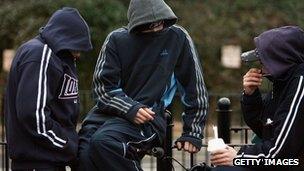Anti-social behaviour training 'could defuse conflict'
- Published
- comments

The training would include how to "read" situations and resolve conflicts
Members of the public should be given lessons in how to tackle anti-social behaviour, a charity has suggested.
The RSA, which aims to solve "social challenges", says police officers or volunteers could provide training, including methods to defuse conflict.
Its report says the need to get people involved has become more urgent because of police cuts in England and Wales.
But the Police Federation said officers did not have the resources to offer such training because of the cuts.
The RSA (Royal Society for the encouragement of Arts, Manufactures and Commerce) says the English riots of a year ago "laid bare both the risks and strengths of self-organised citizen defence".
And it says there is a growing interest in the idea of training people to deal with low-level crime and aggressive behaviour on the streets.
Author Ben Rogers said that with "the real prospect of traditional police patrolling being scaled back" it was time to "focus seriously on agreeing the core skills that active citizens need".
The report concludes that, "while public concern for low-level disorder remains high, citizens have little or no confidence to intervene".
And it said introducing the training alongside other measures "aimed at building long-term civic capacity" would "go some way towards healing our anxious communities".
Conflict resolution
The RSA said the training should include:
Self-protection and restraint - what physical steps to take to minimise the risk to oneself
How to "read" a situation - when to walk on by, when it's safe to intervene or when to call the police
Conflict resolution and mediation - how to defuse an argument, forge an agreement and, where appropriate, give an apology
It said training should also be given to "front-line" public servants including public transport workers, traffic wardens and teachers.
Shopkeepers, publicans and postal workers could also benefit from the training, the RSA said.
Although the report recommends that police officers provide the training, it says volunteers could be trained to pass on their knowledge to others.
The National Childbirth Trust - whose classes are run by parents rather than midwives - could work as a model for the scheme, the charity added.
'Society's problems'
Paul McKeever from the Police Federation, who is also a member of the RSA, told the Today programme that while the report contained positive ideas, the police did not have the resources to "take this additional burden on".
He added: "What we're dealing with here is perhaps the symptoms of some much more deep-rooted problems within society. You need to deal with those problems rather than just skimming the surface and dealing with some of the anti-social behaviour that presents itself out there on the streets."
Jane Atkinson from Dfuse coaches people in how to deal with anti-social behaviour
The RSA's report mentions a charity called Dfuse, which trains people in conflict resolution. Its founder Jane Atkinson said its training teaches people to respond to situations, rather than immediately intervene.
"Response might be going round the corner and calling the police," she said. "It might be being a very good witness. It might be actually intervening yourself but only if you feel you can do something.
"The aim is to communicate, to defuse the situation. So what you never do is use the words which spring spontaneously to your lips."
In May, the government announced new plans to tackle anti-social behaviour in England and Wales, including orders to replace Asbos.
Proposals in the government's White Paper include cutting the number of different orders from 19 to six while it said a "community trigger" would force police, councils and agencies to act if five households made a complaint.
- Published22 May 2012
- Published6 August 2012